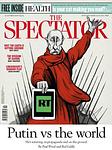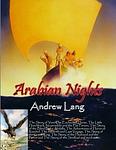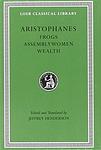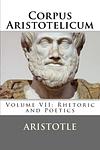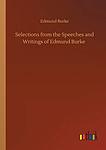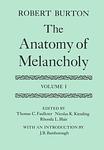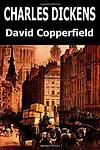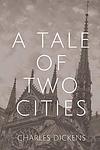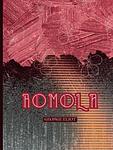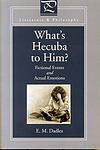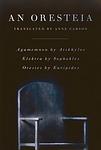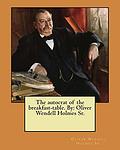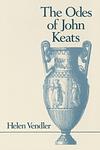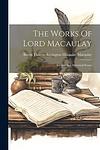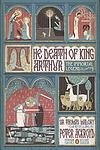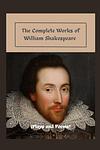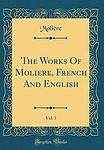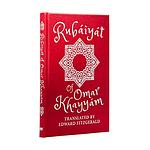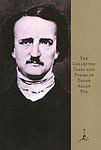James Baldwin, The Book Lover: A Guide to the Best Reading (1910)
This is one of the 305 lists we use to generate our main The Greatest Books list.
-
The Spectator by Joseph Addison
"The Spectator" is a collection of daily publications from the early 18th century that offers a rich commentary on the social, political, and cultural life of England during that period. Through a series of essays and fictional correspondences, the work provides a platform for discussing various topics such as manners, literature, and public behavior. The central figure, a fictional spectator, observes and reports on the world around him, offering insights and critiques that aim to educate and entertain the readers while promoting moral virtues and enlightened thinking. The publication played a significant role in shaping the English essay as a literary form and had a lasting impact on the social discourse of the time.
The 4151st Greatest Book of All Time -
Oresteia by Aeschylus
"Oresteia" is a trilogy of Greek tragedies that tells the story of the House of Atreus. It begins with King Agamemnon's return from the Trojan War and his subsequent murder by his wife, Clytemnestra, and her lover, Aegisthus. The second play focuses on the revenge of their son, Orestes, who kills his mother and her lover to avenge his father's death. The final play deals with the trial of Orestes by the gods for the crime of matricide, resulting in his acquittal and the end of the curse on the House of Atreus. The trilogy explores themes of justice, vengeance, and the intervention of the gods in human affairs.
The 250th Greatest Book of All Time -
Prometheus Bound by Aeschylus
"Prometheus Bound" is a tragedy set in ancient Greece that tells the story of the Titan Prometheus, who defies the gods by giving humans the gift of fire, a symbol of knowledge and civilization. As punishment, Zeus chains Prometheus to a rock in the Caucasus Mountains where he is tormented by a vulture that eats his liver every day, only for it to grow back overnight. Despite his suffering, Prometheus refuses to submit to Zeus' will, embodying the human spirit's unyielding resistance against oppression.
The 484th Greatest Book of All Time -
The Persians by Aeschylus
"The Persians" is an ancient Greek tragedy that tells the story of the Persian King Xerxes and his failed invasion of Greece. The narrative focuses on the aftermath of the Battle of Salamis, depicting the mourning of Xerxes' mother and the ghost of his father Darius, who prophesied the fall of the Persian Empire. It serves as a critique of the arrogance and hubris of Xerxes and a celebration of Greek victory, while also exploring themes of war, loss, and the consequences of ambition.
The 825th Greatest Book of All Time -
The Suppliants by Aeschylus
"The Suppliants" is a classic Greek drama that revolves around a group of fifty women who flee from Egypt to avoid marrying their cousins, seeking asylum in the city of Argos. The King of Argos is torn between offering them protection or facing the wrath of the Egyptians. The play explores themes of democracy, law, and the struggle between the sexes. The drama ends on a cliffhanger, with the Egyptian suitors arriving to reclaim the women and threatening war.
The 885th Greatest Book of All Time -
Seven Against Thebes by Aeschylus
"Seven Against Thebes" is a classic Greek tragedy that revolves around the conflict between the two sons of Oedipus, Eteocles and Polynices, who are fighting for the throne of Thebes. The brothers ultimately kill each other in battle, fulfilling their father's curse that they would divide their inheritance by the sword. The play ends with the women of Thebes mourning the death of the brothers and the city in ruins. The tale is a powerful exploration of family loyalty, power struggles and the consequences of destiny and fate.
The 885th Greatest Book of All Time -
Aesop's Fables by Aesop
This book is a collection of short tales, often featuring animals as characters, which convey moral lessons. The fables, attributed to a storyteller from ancient Greece, are known for their brevity and poignant messages. The stories cover a wide range of themes such as honesty, wisdom, greed, vanity, and humility, and are often concluded with a simple, yet profound, moral lesson. The narratives have been passed down through generations and continue to be relevant in modern times.
The 908th Greatest Book of All Time -
One Thousand and One Nights by Unknown
This is a collection of Middle Eastern folk tales compiled during the Islamic Golden Age. The stories are told by a young woman, who must weave a new tale each night for her husband, a king, to delay her execution. The tales are filled with magic, adventure, love, and betrayal, and include well-known stories such as "Aladdin's Wonderful Lamp", "Ali Baba and the Forty Thieves", and "The Seven Voyages of Sinbad the Sailor".
The 66th Greatest Book of All Time -
The Orlando Furioso by Lodovico Ariosto
"The Orlando Furioso" is an epic poem that tells the story of Orlando, a knight who falls madly in love with a pagan princess. His unrequited love drives him to madness, causing him to abandon his knightly duties and wander aimlessly. The poem also includes various subplots involving other knights and their adventures, including battles with monsters and sorcerers, quests for magical artifacts, and romantic entanglements. The work is known for its complex structure, richly detailed descriptions, and vividly drawn characters.
The 2215th Greatest Book of All Time -
Lysistrata by Aristophanes
"Lysistrata" is a comedic play set in ancient Greece, where the women of Athens, led by the eponymous character, decide to withhold sexual privileges from their husbands and lovers in order to force them to negotiate a peaceful end to the Peloponnesian War. Along with the women of Sparta, they seize the Acropolis and the treasury, and through their non-violent resistance, they manage to bring about a reconciliation between the warring states. The play is a humorous exploration of gender roles and the power of passive resistance.
The 501st Greatest Book of All Time -
The Birds by Aristophanes
This ancient Greek comedy play revolves around two men who are fed up with the problems of human society and decide to create a utopian city in the clouds with the help of birds. Their city, 'Cloudcuckooland', becomes popular and attracts gods and humans alike, leading to a series of humorous and satirical events. The play is a satire on political and social life in Athens, poking fun at its democracy, bureaucracy, and warfare.
The 764th Greatest Book of All Time -
The Clouds by Aristophanes
"The Clouds" is a satirical play that critiques the intellectual and moral corruption of Athenian society by focusing on a father-son relationship. The father, in an effort to evade debt, sends his son to a school of sophistry to learn the art of manipulating language and logic to win arguments. The story explores themes of education, morality, and the conflict between traditional and modern values. The play is well-known for its critical portrayal of Socrates as a sophist and its comedic elements.
The 807th Greatest Book of All Time -
The Assemblywomen by Aristophanes
In this ancient Greek comedy, the women of Athens, fed up with the mismanagement and corruption of male politicians, disguise themselves as men to take over the city's assembly. Once in power, they institute a series of radical reforms, including the communal sharing of wealth and property, and the requirement that the most attractive men must sleep with the ugliest women first to ensure fairness in love. The play satirizes gender roles, political life in Athens, and the utopian solutions to societal problems, all while delivering a humorous yet pointed critique of the effectiveness of democratic governance and the nature of power.
The 4082nd Greatest Book of All Time -
The Frogs by Aristophanes
"The Frogs" is a classic comedic play that delves into the world of Greek mythology and literature. The story follows the god Dionysus as he descends into the underworld with his slave Xanthias. Dionysus seeks to bring back the recently deceased tragedian Euripides to save the city from its cultural decline. However, upon arrival, he finds himself amidst a heated debate between Euripides and Aeschylus, another deceased playwright, over who is the greatest tragedian. A competition ensues, judged by Hades, leading to a series of humorous critiques of their plays and styles. The play is a satirical examination of Athenian society and the role of art and culture, filled with witty dialogue and commentary on the nature of theater.
The 4151st Greatest Book of All Time -
The Knights by Aristophanes
"The Knights" is a satirical comedy that delves into the political landscape of ancient Athens, critiquing the city's leadership through the allegory of a household. The play focuses on the conflict between a noble but dimwitted horseman and a cunning and manipulative sausage-seller, both vying for the favor of their master, who represents the Athenian people. The sausage-seller, with the help of the chorus of knights, ultimately triumphs, symbolizing the hope for a new and better leader. The work is a pointed commentary on the demagoguery and corruption of the time, using humor and absurdity to explore themes of power, populism, and the responsibilities of citizenship.
The 2400th Greatest Book of All Time -
The Wasps by Aristophanes
"The Wasps" is a classical Greek comedy that satirizes the Athenian legal system and the citizenry's obsession with litigation. The play revolves around an elderly man, Philocleon, who is addicted to serving on juries and the comical lengths to which his son, Bdelycleon, goes to cure him of this addiction. The son eventually manages to keep his father at home by staging a mock trial of household pets, highlighting the absurdity of the legal proceedings. Through sharp wit and humor, the play critiques the flaws of democracy and the frivolity of the Athenian courts, while also exploring themes of generational conflict and the nature of justice.
The 4151st Greatest Book of All Time -
Corpus Aristotelicum by Aristotle
The "Corpus Aristotelicum" is a collection of texts by an ancient Greek philosopher, providing an extensive exploration of numerous fields of knowledge, such as metaphysics, ethics, logic, politics, biology, and poetry. These works have been instrumental in shaping Western philosophy and have had a profound influence on a wide range of subjects, including science, theology, and politics. The collection is known for its systematic and logical approach, and for its groundbreaking ideas that continue to stimulate intellectual discourse.
The 762nd Greatest Book of All Time -
Essays by Francis Bacon
This collection is a seminal work of English literature, comprising a series of essays that delve into various subjects, ranging from politics and religion to love and truth. Written in the early 17th century, the essays are celebrated for their concise wisdom, rhetorical brilliance, and the author's deep insights into human nature and the complexities of life. The author, a philosopher, statesman, and scientist, employs a didactic style, offering practical advice and reflections on morality and ethics, which have remained relevant through the ages. The work is not only a reflection of the author's vast intellect and observational prowess but also serves as a valuable philosophical guide, illuminating the human condition and the societal norms of his time.
The 1711th Greatest Book of All Time -
The Bible by Unknown
The Bible is the central religious text of Christianity, comprising the Old and New Testaments. It features a diverse collection of writings including historical narratives, poetry, prophecies, and teachings. These texts chronicle the relationship between God and humanity, detail the life, death, and resurrection of Jesus Christ, and follow the early Christian church. Considered divinely inspired by believers, it serves as a foundational guide for faith and practice, influencing countless aspects of culture and society worldwide.
The 34th Greatest Book of All Time -
Lorna Doone by R. D. Blackmore
Set in the 17th century in the Exmoor region of England, the novel is a romantic adventure centered around John Ridd, a farmer who falls in love with Lorna Doone, a beautiful girl from a notorious family of outlaws. Their star-crossed relationship faces numerous obstacles, including social class differences, family feuds, and the violent history between the Doones and the Ridds. As John strives to rescue Lorna from her family's criminal clutches and the machinations of a villainous nobleman, the story unfolds with themes of justice, revenge, and the power of love to overcome adversity.
The 952nd Greatest Book of All Time -
The Life of Samuel Johnson by James Boswell
"The Life of Samuel Johnson" is a comprehensive biography that chronicles the life of one of the most prominent English literary figures of the 18th century. The book provides an in-depth account of Samuel Johnson's life, his literary works, and his significant contribution to English literature. It also offers a detailed portrait of his personality, his relationships, his struggles with depression and illness, and his views on a variety of subjects. The book is as much a biography of Johnson as it is a portrayal of 18th-century England.
The 244th Greatest Book of All Time -
Religio Medici by Sir Thomas Browne
"Religio Medici" is a deeply personal essay that explores the author's spiritual beliefs and philosophical thoughts on religion and medicine. Written in the 17th century, the text delves into the author's reflections on the nature of faith, the relationship between science and religion, and the practice of medicine as a spiritual calling. The author argues for a rational and tolerant approach to religious understanding, advocating for the coexistence of scientific inquiry and religious faith. The work is known for its eloquent prose and the introspective examination of the author's own beliefs and experiences, offering a unique insight into the intellectual landscape of the time.
The 2400th Greatest Book of All Time -
Pilgrim's Progress by John Bunyan
This Christian allegory follows a man named Christian on his journey from his hometown, the "City of Destruction," to the "Celestial City" on Mount Zion. Christian faces numerous obstacles and temptations along the way, including the Slough of Despond, Vanity Fair, and the Valley of the Shadow of Death. The narrative serves as a metaphor for the believer's journey from sin and despair to salvation and eternal life.
The 353rd Greatest Book of All Time -
Selections From The Speeches And Writings Of Edmund Burke by Edmund Burke
This book is a compilation of excerpts from the speeches and writings of Edmund Burke, an influential 18th-century statesman and philosopher. Known for his strong support of the American Revolution and his opposition to the French Revolution, Burke's work covers a wide range of political and social issues. The selections in this volume highlight his thoughts on human rights, government, and society, showcasing his eloquent style and his commitment to the principles of conservatism and liberalism. This collection provides insight into Burke's complex and thoughtful perspectives that have made him a foundational figure in Western political thought.
The 3791st Greatest Book of All Time -
Poems Of Robert Burns by Robert Burns
This collection showcases the lyrical genius of a celebrated Scottish poet, renowned for his pioneering use of the Scots language and his profound influence on the Romantic movement. The anthology includes a rich variety of poems, ranging from heartfelt songs of love and friendship to biting satires and social commentaries. The poet's works reflect his deep connection to the Scottish countryside, his empathy for the common man, and his passionate advocacy for social equality. His enduring legacy is evident in the timeless appeal of his verses, which continue to resonate with readers around the world, capturing the universal human experience with wit, emotion, and eloquence.
The 2400th Greatest Book of All Time -
The Anatomy of Melancholy by Robert Burton
"The Anatomy of Melancholy" is a comprehensive and detailed exploration of melancholy, a term used to describe a variety of mental states, including depression, anxiety, and sadness. The author examines the causes, symptoms, and treatments of melancholy from a variety of perspectives, incorporating elements of psychology, philosophy, history, and literature. The book is notable for its extensive use of classical sources, its humorous and satirical style, and its profound insights into human nature and the human condition.
The 1241st Greatest Book of All Time -
On Heroes, Hero Worship, & The Heroic In History by Thomas Carlyle
The book explores the influence of heroes and their impact on history, arguing that the course of history is largely determined by the actions of great men and women. The author categorizes heroes into different types, such as divinities, prophets, poets, priests, men of letters, and rulers, examining their roles and the reverence afforded to them by society. Through a series of lectures, the work delves into the characteristics of these heroes, the nature of their leadership, and their ability to inspire followers and shape the cultural and political landscapes of their times. The book asserts that hero worship is an essential part of human nature and a driving force in the development of civilization.
The 6745th Greatest Book of All Time -
Selected Prose by Thomas Carlyle
"Selected Prose" is a compilation of various prose writings by a renowned 19th-century essayist and historian, known for his social criticism and satirical style. The collection showcases the author's mastery of language and his deep engagement with the cultural, political, and spiritual issues of his time. Through essays, lectures, and historical analyses, the book reflects on themes such as the nature of heroism, the impact of the industrial revolution, and the evolution of society. The author's distinctive voice and insightful commentary provide readers with a rich exploration of Victorian thought and the enduring questions of human existence.
The 4151st Greatest Book of All Time -
Don Quixote by Miguel de Cervantes
This classic novel follows the adventures of a man who, driven mad by reading too many chivalric romances, decides to become a knight-errant and roam the world righting wrongs under the name Don Quixote. Accompanied by his loyal squire, Sancho Panza, he battles windmills he believes to be giants and champions the virtuous lady Dulcinea, who is in reality a simple peasant girl. The book is a richly layered critique of the popular literature of Cervantes' time and a profound exploration of reality and illusion, madness and sanity.
The 12th Greatest Book of All Time -
The Canterbury Tales by Geoffrey Chaucer
The Canterbury Tales is a collection of 24 stories that follows a group of pilgrims traveling from London to Canterbury to visit the shrine of Saint Thomas Becket. Told in Middle English, the tales are narrated by a diverse group of pilgrims, including a knight, a miller, a reeve, and a pardoner, who share their stories to pass the time during their journey. The tales, which range from chivalrous romances to bawdy fabliaux, provide a colorful, satirical, and critical portrayal of 14th century English society.
The 103rd Greatest Book of All Time -
Catiline Orations by Marcus Tullius Cicero
"Catiline Orations" is a series of speeches given by a renowned Roman statesman, which were aimed at exposing and condemning the conspiracy led by Lucius Sergius Catilina. The speeches, delivered in the Roman Senate, are a masterful display of oratory skills and political acumen, as the statesman successfully manages to turn the Senate against Catiline, ultimately leading to his downfall. The book offers an in-depth study of these speeches, providing valuable insights into Roman politics, rhetoric, and the art of persuasion.
The 3093rd Greatest Book of All Time -
Treatises On Friendship And Old Age by Marcus Tullius Cicero
The book comprises two philosophical essays that delve into the nature and significance of friendship and the challenges and wisdom of old age. The first essay explores the meaning of true friendship, its role in society, and its importance as a foundation for moral and happy life, emphasizing mutual respect, virtue, and genuine affection. The second essay addresses the concerns of aging, arguing against the common perceptions of old age as a miserable phase. Instead, it presents old age as a period capable of great mental and intellectual activity and satisfaction, provided one has lived a life based on virtue and fulfillment. Through these essays, the text provides timeless insights into handling some of life's most profound transitions with grace and wisdom.
The 3791st Greatest Book of All Time -
On Obligations by Marcus Tullius Cicero
"On Obligations" is a philosophical treatise that explores the ethical and moral duties of individuals in society. Written in the form of a dialogue, the text delves into the nature of justice, the importance of the common good, and the role of virtue in personal and public life. The author articulates a framework for understanding and fulfilling one's obligations, which he argues are derived from both natural law and human reason. Through a detailed examination of various ethical dilemmas and practical situations, the work provides insights into how individuals should act with integrity and wisdom to uphold both legal and moral responsibilities.
The 3791st Greatest Book of All Time -
The Complete Poems of Samuel Taylor Coleridge by Samuel Taylor Coleridge
This book is a comprehensive collection of the works of a renowned English poet, featuring his most famous pieces as well as lesser-known works. The poems are known for their romantic and imaginative style, with themes ranging from nature and the supernatural to human emotion and philosophical musings. The collection offers a deep insight into the poet's creative and intellectual mind, making it a valuable resource for literature enthusiasts and scholars alike.
The 1122nd Greatest Book of All Time -
The Divine Comedy by Dante Alighieri
In this epic poem, the protagonist embarks on an extraordinary journey through Hell (Inferno), Purgatory (Purgatorio), and Paradise (Paradiso). Guided by the ancient Roman poet Virgil and his beloved Beatrice, he encounters various historical and mythological figures in each realm, witnessing the eternal consequences of earthly sins and virtues. The journey serves as an allegory for the soul's progression towards God, offering profound insights into the nature of good and evil, free will, and divine justice.
The 27th Greatest Book of All Time -
Robinson Crusoe by Daniel Defoe
The book is a classic adventure novel about a man who spends 28 years on a remote tropical island near Trinidad, encountering cannibals, captives, and mutineers before being rescued. The story is noted for its realistic portrayal of the protagonist's physical and psychological development and for its detailed depiction of his attempts to create a life for himself in the wilderness. The novel has been interpreted as an allegory for the development of civilization, as well as a critique of European colonialism.
The 77th Greatest Book of All Time -
A Crown of Feathers and Other Stories by Isaac Bashevis Singer
"A Crown of Feathers and Other Stories" is a collection of short stories that delve into the human condition, often through the lens of Jewish culture and history. The tales are filled with elements of fantasy and folklore, exploring themes such as morality, love, loss, and the struggle between good and evil. The characters grapple with ethical dilemmas, personal identities, and the complexities of relationships, while the narrative style often combines realism with the supernatural, creating a unique blend of the mundane and the mystical.
The 5738th Greatest Book of All Time -
Selected Speeches by Demosthenes, Robin Waterfield
"Selected Speeches" is a compilation of orations by one of ancient Greece's most renowned orators, Demosthenes. The collection, translated and edited by Robin Waterfield, showcases Demosthenes' eloquence and his passionate involvement in the political life of Athens. Through these speeches, readers gain insight into the complex social and political issues of the time, including the struggle against Macedonian influence under Philip II. The speeches not only highlight Demosthenes' rhetorical prowess but also reflect the dynamics of power and resistance in classical Athens, offering a window into the art of persuasion and the civic identity of the Athenians.
The 6745th Greatest Book of All Time -
David Copperfield by Charles Dickens
This novel follows the life of its titular protagonist from his childhood to maturity. Born to a young widow, David endures a difficult childhood when his mother remarries a harsh and abusive man. After his mother's death, he is sent to a boarding school before being forced into child labor. As he grows, David experiences hardship, love, and loss, all the while meeting a colorful array of characters. The novel is a journey of self-discovery and personal growth, showcasing the harsh realities of 19th-century England.
The 45th Greatest Book of All Time -
Dombey and Son by Charles Dickens
"Dombey and Son" is a classic novel that explores the life of a wealthy and powerful businessman who is obsessed with maintaining his family's prestige. He places high hopes on his son while neglecting his daughter, only to face devastating loss and disappointment. The narrative is a complex web of relationships, social critiques, and vivid characters, all set against the backdrop of Victorian England. The story ultimately underscores the importance of love, compassion, and familial bonds over wealth and social status.
The 782nd Greatest Book of All Time -
Nicholas Nickleby by Charles Dickens
The story follows Nicholas Nickleby, a young man who becomes the head of his family after his father's death. He and his family are left penniless by an unscrupulous uncle, who also sends Nicholas to work in a cruel and abusive boarding school. Nicholas eventually escapes, travels the country, meets a variety of eccentric characters, and has many adventures. Throughout his journey, Nicholas struggles against adversity and the greed and cruelty of others, while aiming to protect his sister and mother. The novel is a social critique, highlighting the terrible conditions of schools and the plight of the poor in 19th-century England.
The 883rd Greatest Book of All Time -
The Old Curiosity Shop by Charles Dickens
The Old Curiosity Shop tells the story of Little Nell Trent, a beautiful and virtuous young girl who lives with her grandfather in his shop of curiosities. After her grandfather loses his entire fortune with his gambling addiction, he and Nell are forced to leave their home and live as beggars. The novel follows their journey across England and the various characters they meet along the way, including the villainous dwarf Quilp, who pursues them relentlessly. The book is a mix of humor and pathos, exploring themes of virtue, resilience, and the harsh realities of life in 19th-century England.
The 1300th Greatest Book of All Time -
A Tale of Two Cities by Charles Dickens
Set against the backdrop of the French Revolution, this classic novel explores themes of class struggle, sacrifice, and resurrection. The narrative follows the lives of several characters, including a dissipated English lawyer, a man who is a long-term prisoner in the Bastille, and a woman who becomes embroiled in the political turmoil of the time. The story is a riveting tale of love and sacrifice, with the infamous guillotine looming in the background, symbolizing the violence and unrest of the era.
The 237th Greatest Book of All Time -
The Pickwick Papers by Charles Dickens
The book is a humorous and satirical depiction of English society in the 19th century, told through the travels and adventures of a group of gentlemen from London, led by a kind-hearted and naive man. Their escapades take them to various locales where they encounter a plethora of eccentric characters and find themselves in comical and sometimes absurd situations. The narrative is interspersed with tales and anecdotes told by the characters themselves, adding to the richness and diversity of the overall story.
The 213th Greatest Book of All Time -
The Works Of John Dryden by John Dryden
This compilation is a comprehensive collection of the literary output of a prominent 17th-century English poet, critic, and playwright. It encompasses a wide array of genres, including satirical verses, heroic couplets, and influential essays on dramatic theory. The author's work is notable for its wit, intellectual depth, and the adaptation of classical models for contemporary audiences. His plays and poems reflect the political and social milieu of Restoration England, and his critical essays are seminal in the development of literary criticism. The collection showcases the author's mastery of language and his significant contribution to English literature.
The 2400th Greatest Book of All Time -
Adam Bede by George Eliot
"Adam Bede" is a 19th-century novel set in rural England that explores the themes of love, betrayal, and moral responsibility. The story revolves around a hardworking carpenter, Adam Bede, who is in love with a vain but beautiful dairymaid, Hetty Sorrel. However, Hetty is seduced by a young, thoughtless squire, Arthur Donnithorne, which leads to her becoming pregnant. When Arthur abandons her, Hetty leaves her baby in the woods, where it dies, and she is subsequently charged with infanticide. Adam, devastated by Hetty's actions, finds solace and eventually love with a devout Methodist preacher, Dinah Morris. The novel ends with Adam and Dinah marrying, finding happiness after the tragedy.
The 471st Greatest Book of All Time -
The Mill on the Floss by George Eliot
"The Mill on the Floss" is a novel that explores the lives of siblings Tom and Maggie Tulliver, who grow up at Dorlcote Mill on the River Floss. The book delves into their experiences in the rural society of the time, their complex relationship, and the choices they make in adulthood. The story is marked by themes of love, betrayal, societal expectations, and the struggle between individual desires and family obligations. The tragic ending underscores the consequences of societal norms and the struggle against them.
The 332nd Greatest Book of All Time -
Romola by George Eliot
Set against the backdrop of the Italian Renaissance in 15th-century Florence, this novel weaves the tale of a young and noble woman who navigates the complexities of her life amidst political and personal turmoil. As she grapples with the moral decay of her husband and the societal expectations placed upon her, she embarks on a journey of self-discovery and intellectual awakening. Through her trials and tribulations, the protagonist emerges as a figure of resilience and virtue, embodying the ideals of enlightenment and personal growth. The narrative not only explores themes of love, betrayal, and redemption but also delves into the historical and cultural milieu of Renaissance Italy, offering a rich tapestry of the period's art, politics, and philosophy.
The 2289th Greatest Book of All Time -
Middlemarch by George Eliot
Set in the fictitious English town of Middlemarch during the early 19th century, the novel explores the complex web of relationships in a close-knit society. It follows the lives of several characters, primarily Dorothea Brooke, a young woman of idealistic fervor, and Tertius Lydgate, an ambitious young doctor, who both grapple with societal expectations, personal desires, and moral dilemmas. Their stories intertwine with a rich tapestry of other townsfolk, reflecting themes of love, marriage, ambition, and reform, making a profound commentary on the human condition.
The 23rd Greatest Book of All Time -
Daniel Deronda by George Eliot
"Daniel Deronda" is a novel that explores the intersecting lives of its two main characters: Gwendolen Harleth, a beautiful but shallow young woman who is forced into an oppressive marriage to escape poverty, and Daniel Deronda, a compassionate and intelligent young man who, after being raised by a wealthy English gentleman, discovers his Jewish heritage. The story delves into themes of love, identity, and moral responsibility, set against the backdrop of Victorian England's societal norms and prejudices.
The 568th Greatest Book of All Time -
The Essential Writings of Ralph Waldo Emerson by Ralph Waldo Emerson
This book is a comprehensive collection of works by a renowned American philosopher and poet. It includes his most influential essays, lectures, and poetry, providing readers with a deep insight into his thoughts on nature, self-reliance, love, friendship, freedom, and the importance of intellectual independence. The book serves as a guide to the author's transcendental philosophy and his belief in individualism, nonconformity, and the inherent goodness of man and nature.
The 725th Greatest Book of All Time -
Discourses Of Epictetus by Epictetus
"Discourses of Epictetus" is a philosophical work that compiles the teachings of the Stoic philosopher Epictetus, as recorded by his pupil Arrian. The text is a practical guide for applying philosophy to daily life, emphasizing ethics, personal freedom, and mental strength. It explores how to live virtuously in accordance with nature, control one's emotions, and maintain tranquility by focusing only on what is within one's control. The discourses delve into discussions about the nature of human beings, the purpose of life, and the path to happiness, offering insights that aim to equip individuals with the resilience and wisdom necessary to lead fulfilling lives.
The 1958th Greatest Book of All Time -
Medea by Euripides
"Medea" is a Greek tragedy that tells the story of Medea, a former princess of the "barbarian" kingdom of Colchis, and her husband Jason, who leave her to marry Glauce, the daughter of Creon, king of Corinth. In a fit of rage, Medea decides to take revenge on Jason by killing their children, Jason's new wife, and her father, King Creon. The play explores themes of revenge, women's rights, and the dangers of absolute power.
The 218th Greatest Book of All Time -
The Bacchae by Euripides
"The Bacchae" is a classic Greek tragedy where the god Dionysus, disguised as a mortal, returns to his birthplace in Greece to punish the impious King Pentheus who denies Dionysus's divine nature and refuses to worship him. The narrative explores themes of revenge, mortality, and the relationship between man and god. Dionysus uses his power to drive the women of the city into a crazed frenzy, leading to a tragic end for King Pentheus and his mother Agave.
The 374th Greatest Book of All Time -
Trojan Women by Euripides
"Trojan Women" is a tragic play set in the aftermath of the Trojan War, focusing on the fate of the women of Troy. The story follows the mother of Hector, Hecuba, and her daughter-in-law, Andromache, as they grapple with the loss of their city and loved ones. They, along with other women, are destined to become slaves to the victorious Greeks. The narrative explores themes of war, suffering, and the resilience of women in the face of adversity.
The 711th Greatest Book of All Time -
Hippolytus by Euripides
"Hippolytus" is a tragic play that revolves around the themes of lust, revenge, and the wrath of the gods. The story follows the character Hippolytus, a dedicated follower of the goddess Artemis, who spurns the advances of his stepmother Phaedra. In a fit of jealousy, Phaedra falsely accuses Hippolytus of rape, leading his father Theseus to curse him. The resulting divine punishment and misunderstandings lead to the tragic deaths of both Hippolytus and Phaedra, revealing the devastating consequences of deceit and the unforgiving nature of the gods.
The 1079th Greatest Book of All Time -
Alcestis by Euripides
"Alcestis" is a Greek tragedy that tells the story of a queen who voluntarily chooses to die in place of her husband, the king, when he is fated to die early. The king's friend, Heracles, visits them and, unaware of the queen's death, is offended that he is not being properly entertained. Upon learning the truth, he fights and defeats Death to bring the queen back to life, restoring happiness to the royal household. The play explores themes of love, sacrifice, death, and the power of friendship.
The 1687th Greatest Book of All Time -
Andromache by Euripides
The play centers on the plight of Andromache, a Trojan widow and the former wife of Hector, who is now a slave to the Greek conqueror Neoptolemus. She struggles to protect her son from the murderous intentions of Neoptolemus' new wife, Hermione, and her father, Menelaus. Andromache seeks sanctuary at the shrine of Thetis, as she confronts the harsh realities of her reduced status and the political machinations of her enemies. The play examines themes of power, revenge, and the fates of women in a world ravaged by war, ultimately leading to an intervention by the god Peleus, which prevents further bloodshed and resolves the immediate conflict.
The 4151st Greatest Book of All Time -
Ion by Euripides
"Ion" is a classical Greek tragedy that revolves around themes of identity, fate, and the complexities of family relationships. The play tells the story of a young man, Ion, who serves as an attendant at the temple of Apollo in Delphi. Unbeknownst to him, he is the son of Apollo and Creusa, the queen of Athens. Creusa, having been raped by Apollo and believing her child was dead, comes to the temple seeking answers about her lost son. A series of oracular revelations and dramatic encounters eventually lead to the recognition and reunion of mother and son. The play explores the intervention of the gods in human lives, the nature of legitimacy and inheritance, and the reconciliation of past trauma with present joy.
The 4151st Greatest Book of All Time -
Iphigenia At Aulis by Euripides
In this ancient Greek tragedy, a dire situation unfolds as the Greek fleet, ready to sail for Troy, is becalmed at Aulis. The leader of the Greeks, Agamemnon, faces a harrowing choice when the seer Calchas reveals that the goddess Artemis demands the sacrifice of his daughter, Iphigenia, to appease her and allow the winds to blow once more. Torn between duty and love, Agamemnon lures his daughter to Aulis under the pretense of a marriage to Achilles, only to confront the moral dilemma of sacrificing his child for the sake of his army's success. The play delves into themes of honor, sacrifice, and the devastating costs of war, as characters grapple with their fates and the consequences of their choices.
The 4151st Greatest Book of All Time -
Heracles by Euripides
The play centers on the tragic hero Heracles, who, upon returning home from his labors, discovers that his wife and children are about to be executed by a tyrant who has usurped his throne. In a cruel twist of fate, Heracles is driven mad by the goddess Hera and, in his insanity, slays his own family, believing them to be his enemies. Upon regaining his sanity and realizing the horror of what he has done, Heracles is confronted with the unbearable weight of his actions and the loss of his family, leaving him to grapple with his guilt and the question of how to continue living after such a catastrophe.
The 4151st Greatest Book of All Time -
Hecuba by Euripides
The tragedy centers on the sorrow and vengeance of a queen who has lost her city, her husband, and her children to war. After the fall of Troy, she becomes a slave to the Greeks and faces the ultimate horror of witnessing the sacrifice of her daughter and the brutal murder of her last surviving son. Her grief transforms into a dark quest for retribution, leading her to take justice into her own hands, which raises profound questions about morality and the limits of human suffering.
The 4151st Greatest Book of All Time -
Orestes by Euripides
The play centers around Orestes, who, after obeying the god Apollo's command to avenge his father Agamemnon's murder by killing his mother Clytemnestra and her lover Aegisthus, is tormented by the Furies and rejected by his community. Facing execution, Orestes, along with his sister Electra and friend Pylades, concocts a desperate plan for survival that includes the potential murder of Helen, the wife of his absent brother Menelaus, and the taking of her daughter Hermione as a hostage. The play explores themes of justice, revenge, and the complexities of familial loyalty, culminating in a divine intervention that offers a resolution to Orestes' plight.
The 4151st Greatest Book of All Time -
Tom Jones by Henry Fielding
This classic novel tells the story of Tom Jones, a charming and good-hearted but impulsive young man, who is expelled from his adoptive family home due to his wild behavior and love for the beautiful Sophia Western. His journey through 18th-century England is filled with adventures, misadventures, and a colorful cast of characters, as he struggles with his identity and seeks redemption. The narrative explores themes of class, virtue, and morality, and is known for its humor, social satire, and vivid characterization.
The 91st Greatest Book of All Time -
Chronicles by Jean Froissart
The book in question is a historical narrative that provides a detailed account of the events, politics, and warfare of the 14th century, particularly focusing on the Hundred Years' War between England and France. The author, a medieval French chronicler, compiled extensive anecdotes, interviews, and reports, offering readers a vivid portrayal of the chivalric age, the lives of nobility, the impact of battles, and the social and political dynamics of the time. His work is considered one of the most important primary sources for the period it covers, offering a blend of factual history and the author's own interpretations and biases, reflecting the complex tapestry of medieval European society.
The 4151st Greatest Book of All Time -
The Decline and Fall of the Roman Empire by Edward Gibbon
This historical work provides a comprehensive perspective on the fall of the Roman Empire, examining its decline from the height of its power in the second century A.D. through the fall of Constantinople in 1453. The author meticulously chronicles the empire's deterioration due to a variety of factors, including moral decay, economic crisis, military incompetence, barbarian invasions, and internal power struggles, while also offering insightful commentary on the broader implications for Western civilization.
The 370th Greatest Book of All Time -
Faust by Johann Wolfgang von Goethe
The book is a tragic play in two parts that tells the story of a scholarly man named Faust, who becomes dissatisfied with his life and makes a pact with the devil, Mephistopheles. In exchange for unlimited knowledge and worldly pleasures, Faust agrees to give his soul to Mephistopheles after death. The narrative explores themes of ambition, despair, love, and redemption, ultimately leading to Faust's salvation.
The 84th Greatest Book of All Time -
The Vicar of Wakefield by Oliver Goldsmith
"The Vicar of Wakefield" follows the life of Dr. Primrose, a vicar living happily with his wife and six children in an affluent English parish. However, their lives take a drastic turn when they lose their fortune and are forced to move to a new, more modest parish. Despite facing numerous hardships, including the imprisonment of Dr. Primrose and the abduction of his daughter, the family remains resilient, relying on their faith and love for each other to overcome adversity. The story is a classic portrayal of family values, resilience, and the triumph of virtue over vice.
The 415th Greatest Book of All Time -
The Scarlet Letter by Nathaniel Hawthorne
Set in 17th-century Puritan Boston, this novel tells the story of a woman who conceives a daughter through an affair and struggles to create a new life of repentance and dignity. She is forced to wear a scarlet "A" on her dress as a sign of her adultery while her lover, a revered local minister, remains unnamed and unpunished. Throughout the book, themes of sin, legalism, and guilt are explored.
The 58th Greatest Book of All Time -
The Marble Faun by Nathaniel Hawthorne
The novel is a dark romantic tale set in 19th-century Italy that follows the intertwined lives of four characters: the innocent Miriam, the contemplative Kenyon, the charming Donatello, and the mysterious Hilda. As they explore art, love, and the nature of sin, a tragic event involving a mysterious crime at a Roman villa leads to a profound transformation in each of their lives. The story delves into themes of guilt, redemption, and the moral complexities of the human soul, all against the backdrop of Italy's rich cultural heritage and the enigmatic presence of the titular marble faun, a statue that symbolizes the intersection of the divine and the mortal.
The 4151st Greatest Book of All Time -
The Blithedale Romance by Nathaniel Hawthorne
"The Blithedale Romance" is a novel about a group of people who establish a utopian society in rural Massachusetts. The story, narrated by a man named Miles Coverdale, explores the dynamics of this community and the relationships between its members, particularly the love triangle between him, a charismatic but mysterious man, and a woman who rejects traditional gender roles. The novel delves into themes of idealism, romanticism, and the harsh realities of attempting to create a perfect society.
The 2080th Greatest Book of All Time -
The House of the Seven Gables by Nathaniel Hawthorne
This novel revolves around the cursed Pyncheon family, who live in a gloomy New England mansion, cursed due to the actions of their ancestor who had an innocent man hanged as a witch to seize his property. The story explores themes of guilt, retribution, and atonement, and the narrative is interspersed with the author's philosophical musings. The present-day Pyncheons include an old maid, a daguerreotypist, and their elderly, reclusive cousin who returns to the house after a mysterious absence of many years.
The 487th Greatest Book of All Time -
The Histories of Herodotus by Herodotus
"The Histories of Herodotus" is an ancient text that provides a comprehensive account of the Greco-Persian Wars. It is often considered the first work of history in Western literature. The author, often referred to as the 'Father of History', provides a narrative that not only discusses the conflicts between the Greeks and Persians, but also delves into the customs, geography, and history of each civilization. This detailed and pioneering work has greatly contributed to our understanding of the ancient world.
The 312th Greatest Book of All Time -
The Autocrat Of The Breakfast Table by Oliver Wendell Holmes Sr.
"The Autocrat of the Breakfast Table" is a collection of essays presented as a series of table talks among the residents of a New England boarding house. Through the voice of the charming and insightful Autocrat, the author explores a wide range of topics, from love and philosophy to society and human nature. The essays are interspersed with poems and witty observations, providing a rich tapestry of thought and language. The work, characterized by its conversational style and intellectual depth, captures the essence of American life and thought in the mid-19th century.
The 6745th Greatest Book of All Time -
The Iliad by Homer
This epic poem focuses on the final weeks of the Trojan War, a conflict between the city of Troy and the Greek city-states. The story explores themes of war, honor, wrath, and divine intervention, with a particular focus on the Greek hero Achilles, whose anger and refusal to fight have devastating consequences. The narrative also delves into the lives of the gods, their relationships with humans, and their influence on the course of events.
The 37th Greatest Book of All Time -
The Odyssey by Homer
This epic poem follows the Greek hero Odysseus on his journey home after the fall of Troy. It takes Odysseus ten years to reach Ithaca after the ten-year Trojan War. Along the way, he encounters many obstacles including mythical creatures, divine beings, and natural disasters. Meanwhile, back in Ithaca, his wife Penelope and son Telemachus fend off suitors vying for Penelope's hand in marriage, believing Odysseus to be dead. The story concludes with Odysseus's return, his slaughter of the suitors, and his reunion with his family.
The 29th Greatest Book of All Time -
Odes by John Keats
"Odes" is a collection of poems that reflect on themes of love, beauty, death, and the passage of time. Through vivid imagery and powerful emotion, the author explores the human condition and our place in the world, often drawing on classical mythology and the natural world for inspiration. The poems are known for their intense lyricism and complex structure, making them some of the most celebrated in English literature.
The 1072nd Greatest Book of All Time -
Epistles by Horace
"Epistles" is a collection of poetic letters offering insights into the human condition, moral philosophy, and the art of living well. Written in the first century BCE, the work reflects the author's mature thoughts on various subjects, ranging from personal ethics to literary criticism. Through these letters, the poet shares his wisdom with friends and notable contemporaries, employing a conversational tone that blends humor, irony, and sincerity. The epistles serve as a guide to practical wisdom, emphasizing moderation, self-awareness, and the importance of living in harmony with nature and society.
The 4151st Greatest Book of All Time -
Satires by Horace
"Satires" is a collection of poetic essays that delve into the follies and vices of Roman society during the first century BCE. Through a series of witty, critical, and often self-deprecating poems, the author explores themes such as greed, corruption, and social ambition, while advocating for a life of moderation and philosophical contentment. Employing a conversational tone and a keen eye for the absurd, the work satirizes the behaviors of both the elite and the common people, offering a timeless reflection on human nature and the pursuit of happiness.
The 4151st Greatest Book of All Time -
Les Misérables by Victor Hugo
Set in early 19th-century France, the narrative follows the lives and interactions of several characters, particularly the struggles of ex-convict Jean Valjean and his journey towards redemption. The story touches upon the nature of law and grace, and elaborates upon the history of France, architecture of Paris, politics, moral philosophy, antimonarchism, justice, religion, and the types and nature of romantic and familial love. It is known for its vivid and relatable characters, and its exploration of societal and moral issues.
The 46th Greatest Book of All Time -
The Sketch Book Of Geoffrey Crayon, Gent. by Washington Irving
The book is a collection of 34 essays and short stories written by an American author, originally published throughout 1819 and 1820. It includes a mix of satire, fantasy, and nostalgic essays, many of which deal with early American rural life and other themes relevant to the post-colonial era. Among its most famous stories are "The Legend of Sleepy Hollow" and "Rip Van Winkle," both of which have become classics of American literature. The book's gentle wit and romanticized descriptions of old England and the American landscape of the author's time have made it a lasting piece of literary artistry.
The 4151st Greatest Book of All Time -
The Kalevala by Elias Lönnrot
"The Kalevala" is an epic poem that compiles Finnish and Karelian folklore into a cohesive narrative. It is centered around the hero Väinämöinen, a shamanistic figure with magical powers, and his adventures with other characters such as the blacksmith Ilmarinen and the reckless Lemminkäinen. The book covers a wide range of themes, from creation myths and heroic quests to romance and revenge, providing a rich tapestry of ancient Finnish culture and mythology.
The 2333rd Greatest Book of All Time -
The Poems of John Keats by John Keats
This book is a compilation of poems by a renowned Romantic poet, who is recognized for his eloquent and expressive use of language. It includes his most famous works, often exploring themes of love, beauty, mortality, and the human condition. The collection showcases the poet's unique ability to capture the intricacies of human emotions and the beauty of nature, making it a must-read for lovers of classic English literature and poetry.
The 1055th Greatest Book of All Time -
Essays by Charles Lamb
The book is a collection of essays that blend autobiography, whimsy, fantasy, and pathos. The author, a noted English essayist, uses his own life experiences as a rich backdrop for his writing, often under the guise of a fictional character. His essays are celebrated for their wit, warmth, and eloquence, and they delve into a wide range of topics, from the joys of childhood to the complexities of human grief. The author's distinctive style and ability to transform the mundane into the extraordinary have secured his place as a master of the personal essay.
The 2400th Greatest Book of All Time -
The Poems Of Henry Wadsworth Longfellow by Henry Wadsworth Longfellow
This collection brings together the lyrical and narrative poetry of one of America's most celebrated poets, encompassing themes of nature, love, life, and death across various stages of the 19th century. The poet's mastery of form and melody is evident in his diverse works, ranging from poignant sonnets to epic tales, all of which reflect his deep humanity and his profound engagement with American history and folklore. His poems resonate with the optimism and the cultural identity of his time, making them enduring treasures in American literature.
The 4688th Greatest Book of All Time -
The Complete Poetical Works Of James Russell Lowell by James Russell Lowell
This collection encompasses the entire range of James Russell Lowell’s poetic work, showcasing his development and mastery as a poet. It includes his early romantic pieces, reflective and satirical works, as well as his later, more philosophical poetry. The anthology highlights Lowell’s lyrical prowess, his deep engagement with social issues, and his profound connection to the natural world. Renowned for his craftsmanship and the versatility of his verse, Lowell’s poems resonate with eloquence and insight, offering readers a comprehensive view of his literary legacy.
The 6745th Greatest Book of All Time -
The Function Of The Poet, And Other Essays by James Russell Lowell
"The Function of the Poet, and Other Essays" is a collection of essays that delve into the roles and responsibilities of poets in society, alongside discussions on various literary and cultural topics. The book explores the idea that poets are not merely creators of beautiful verse, but also insightful commentators who reflect and influence the moral and social dimensions of their time. Through a series of thoughtful and articulate essays, the author examines the broader function of poetry and its enduring impact on readers, advocating for the appreciation of poetry as a vital and dynamic force in the intellectual life of society.
The 6745th Greatest Book of All Time -
Critical And Historical Essays by Thomas Babington Macaulay
"Critical and Historical Essays" is a collection of essays written by a 19th-century historian and politician, which were originally published in various periodicals. The essays cover a wide range of topics, including historical figures such as John Hampden, Lord Burghley, and Machiavelli, as well as literary critiques of poets and dramatists like Milton and Byron. The work is renowned for its clear, vigorous prose and its confident handling of historical and literary material, reflecting the author's political and historical insights. The essays not only illuminate the subjects they cover but also offer a window into the intellectual concerns and styles of the Victorian era.
The 3791st Greatest Book of All Time -
Mahabharata by Vyasa
The book is an English translation of the ancient Indian epic, originally written in Sanskrit, which tells the story of a great war that took place between two groups of cousins, the Kauravas and the Pandavas. The narrative explores themes of duty, righteousness, and honor while also featuring a rich array of gods, goddesses, and supernatural beings. It is not only a tale of war and conflict, but also a profound philosophical and spiritual treatise, containing the Bhagavad Gita, a sacred text of Hindu philosophy.
The 315th Greatest Book of All Time -
Le Morte d'Arthur by Thomas Malory
This classic work is a compilation of stories and legends about the legendary King Arthur, his knights, and the Round Table. It tells of Arthur's rise to power, his quest for the Holy Grail, and his tragic downfall. The book, written in the 15th century, is considered one of the most influential pieces of Arthurian literature and has significantly shaped the modern perception of Arthur, Merlin, Guinevere, Lancelot, and other iconic characters.
The 360th Greatest Book of All Time -
Meditations by Marcus Aurelius
"Meditations" is a collection of personal writings by a Roman Emperor, providing deep insights into Stoic philosophy. The book is a series of introspective reflections on how to deal with life's challenges with wisdom, integrity, self-discipline, and benevolent affection for all mankind. It serves as a manual for self-improvement and moral guidance, emphasizing the importance of accepting things outside of one's control and maintaining a tranquil mind amidst adversity.
The 390th Greatest Book of All Time -
Complete Plays And Poems by Christopher Marlowe
This collection brings together the dramatic and poetic works of a prominent figure in English literature, known for his influence on the Elizabethan drama and for being a contemporary of Shakespeare. The volume includes his famous tragedies, which delve into themes of ambition, power, and human frailty, as well as his historical plays and lesser-known poetry. The author's masterful use of blank verse and overreaching protagonists have cemented his works as classics, showcasing his ability to blend classical themes with Renaissance humanism and to explore complex characters who grapple with inner turmoil and the constraints of their societies.
The 4151st Greatest Book of All Time -
Paradise Lost by John Milton
"Paradise Lost" is an epic poem that explores the biblical story of Adam and Eve's fall from grace in the Garden of Eden. It delves into their temptation by Satan, their subsequent expulsion, and the consequences of their disobedience. The narrative also provides a complex portrayal of Satan as a rebellious angel, who, after being cast out of Heaven, seeks revenge by causing mankind's downfall. The poem is a profound exploration of free will, divine justice, and the human struggle with good and evil.
The 107th Greatest Book of All Time -
The Works of Moliere by Molière
This book is a compilation of the works of a renowned 17th-century French playwright, who is often considered one of the greatest masters of comedy in Western literature. His plays are known for their satirical examination of social norms and human folly, featuring a range of characters from the foolish and the pedantic to the hypocritical and the corrupt. Some of his most famous works included in this collection are "Tartuffe," "The Misanthrope," and "The Imaginary Invalid."
The 1673rd Greatest Book of All Time -
Essays by Michel de Montaigne
This collection of essays explores a wide range of topics such as solitude, cannibals, the power of the imagination, the education of children, and the nature of friendship. The author employs a unique and personal approach to philosophy, using anecdotes and personal reflections to illustrate his points. The essays provide a profound insight into human nature and condition, and are considered a significant contribution to both literature and philosophy.
The 111th Greatest Book of All Time -
The Nibelungenlied by Anonymous
"The Nibelungenlied" is a Middle High German epic poem that narrates the story of dragon-slayer Siegfried at the court of the Burgundians, his murder, his wife Kriemhild's revenge, and the destruction of the Burgundians. The narrative is set in the early medieval period and combines elements of Norse mythology, courtly love, and heroic legend. The poem explores themes of honor, loyalty, love, betrayal, and revenge, and is considered one of the most important works of German literature.
The 607th Greatest Book of All Time -
Rubaiyat of Omar Khayyam by Edward FitzGerald
"Rubaiyat of Omar Khayyam" is a collection of four-line stanzas, or quatrains, translated from Persian poetry. The poems, filled with contemplations on mortality and the transient nature of life, advocate for living in the moment and enjoying life's simple pleasures. The work is revered for its beautiful and evocative imagery, philosophical musings, and its exploration of themes such as love, faith, doubt, and the fleeting nature of time.
The 745th Greatest Book of All Time -
The Complete Works of Plato by Plato
This comprehensive collection compiles the philosophical works of an influential Classical Greek philosopher. The book includes his dialogues, letters, and philosophical musings, exploring topics such as justice, beauty, truth, mathematics, politics, love, and virtue. The philosopher's ideas, including the theory of forms, the allegory of the cave, and the philosopher king, have had a profound impact on Western thought and continue to be studied and debated in modern philosophical and academic circles.
The 357th Greatest Book of All Time -
Parallel Lives by Plutarch
"Parallel Lives" is a collection of biographies of famous Greek and Roman figures, written in pairs to draw comparisons between their lives. The work explores the influence of character on the lives and destinies of these historical figures. The biographies are not only a record of the lives of these individuals, but also provide insight into the times in which they lived, offering a unique perspective on the history and culture of the ancient world.
The 632nd Greatest Book of All Time -
The Complete Tales and Poems of Edgar Allan Poe by Edgar Allan Poe
This collection brings together all of the author's most famous works, including poems, short stories, and novellas. Known for his macabre and gothic storytelling, the author's works are filled with themes of death, love lost, and human frailty. Notable inclusions are the haunting poem "The Raven," the chilling stories "The Tell-Tale Heart" and "The Fall of the House of Usher," and his only complete novel, "The Narrative of Arthur Gordon Pym."
The 121st Greatest Book of All Time
Book, 150 Books
The Book Lover: A Guide To The Best Reading is a literary guidebook written by James Baldwin and first published in 1885. The book is a comprehensive guide to the best books and authors of the time, providing readers with an extensive list of recommended reading. Baldwin covers a wide range of genres, including poetry, fiction, drama, and essays, and offers insightful commentary on each work.
Added 18 days ago.
This list has a weight of 34%. To learn more about what this means please visit the Rankings page.
Here is a list of what is decreasing the importance of this list:
- Voters: 1 person voted
- List: only covers mostly "Western Canon" books
If you think this is incorrect please e-mail us at [email protected].
